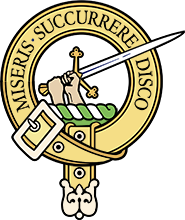Clan MacMillan DNA Project.
Genetic genealogy has become very fashionable in the 21st century and its popularity has spawned a plethora of companies offering DNA testing as a way of discovering ethnic origins and helping trace ancestors. As a result most Scottish clans now have DNA databases in which members can log the results of such tests and compare them to others who the tests show may be related to them.
The Clan MacMillan DNA Project was started in 2004 by the late Adhaniá McMullen Olson and is now co-administered by Gary McMillian (Austin TX), David W. McMillan (Bon Air VA) and Robert McMillan (Stockton AL). It is hosted by Family Tree DNA [FTDNA] and has over 650 participants from around the world, including Chief George MacMillan.
While the Autosomal and Mitochondrial DNA tests offered by some other well-known companies show ethnic origins and can offer limited help with male-line ancestral research, it is the Y-DNA tests offered by FTDNA - which are not offered by Ancestry.com (the most famous name in this field) - that are most useful to clans.
In theory every man passes to his son an exact duplicate of his own Y-Chromosone DNA, allowing us to say that every man alive who possesses an exact match of another man's Y-Chromosone DNA must be descended from the same male ancestor; so, again in theory, every man called M'millan should have the same Y-Chromosone DNA. In practice it's rare for Y-Chromosone DNA to descend entirely unaltered for many generations, and tiny changes ("mutations") take place fairly regularly. DNA genealogists use these changes to track branches off a family line, and claim that it's possible to say roughly when a branch came off that line using the nature and number of these mutations.
Clans have never just consisted of direct male-line descendants of its founder, especially the most powerful clans who conquer the lands of other clans and absorb their members into their own kindred by marriage and/or name-change. We know therefore that any clan Y-DNA project is going to show many different results. That is especially so in the case of a particularly old clan like the MacMillans. Identical and closely-matched results of Y-DNA tests are identified as "haplogroups", and the largest M'millan haplogroup - which includes Chief George MacMillan - currently has over 125 members. The next largest has over 45 members, and there are several other haplogroups with 10 to 20 members in each.
The results of some bearers of septnames, such as Baxter, Bell/Beall, Brown, Milliken/Mulligan and Walker, appear to confirm their ancestral connections with Clan MacMillan. The results from other clan projects, such as Cameron, MacCallum, MacLellan, Mackinnon and MacGregor, suggest that the sort of shared ancestry reported in traditional clan histories and ancient genealogies may have some substance.
If you have already had a DNA test done by another company, it may be possible to transfer the data from it to the Clan MacMillan Project via the FTDNA Autosomal Transfer Program (consult the Clan MacMillan Project administrators, Gary, David, or Robert by email).
If you have not yet had a DNA test done, we recommend you use FTDNA and ask for a Y-DNA test - though if you wish, you can also have an Autosomal and/or Mitochondrial test. The latter is particularly relevant for females since they do not have a Y-Chromosone, but female M'millans can participate in the clan project by asking their nearest known male M'millan relative to do a Y-DNA test. FTDNA does not do tests for health purposes and will not share your data with other commercial companies.
Testers remain anonymous, being assigned a kit number by the testing company. You can elect to retain complete anonymity or you can choose to participate actively in the clan project by providing your email address and allowing your Y-DNA matches to contact you. By sharing your tests results and listing your most distant known paternal ancestor you can help define the various Y-DNA branches of Clan MacMillan.
Tests offered by FTDNA
The standard starter test is now 37 markers, which costs $119 USD. If you can afford it, the 111 marker test at $249 USD is preferable since it tightens your estimated TMRCA [Time to Most Recent Common Ancestor] which other participants can use to judge if you might share the same common ancestor. The "Big Y-700" is the best, most comprehensive Y-DNA test offered by FTDNA, and it is normally $449 USD (sale prices are periodically offered so it's worth watching the FTDNA website for what can be substantial reductions on these prices). You can upgrade later if you take one of the lesser tests.
More information
For more information about DNA testing and the Clan MacMillan DNA Project, contact Gary, David, or Robert or go to the project website. Another page of the website has Y-Chromosome DNA (Y-DNA) STR results for the project. See the MacMillan Y DNA Project Facebook page.
